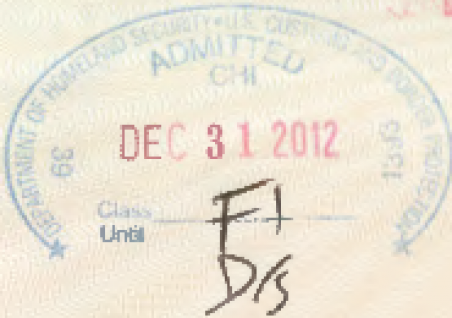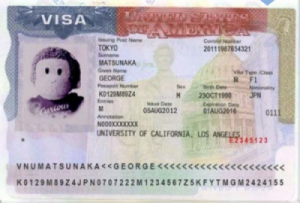Visa vs. Status: One can Expire; the Other May Not!
In casual conversation, the term 'visa' is often used interchangeably to mean both a person’s visa and their status. For example, you will hear someone say: “He is here on a visa.” Or: “She is applying for a work visa.” While this gives the listener a general idea within the context of the conversation, it is inadequate for the understanding of what visa really means (and doesn’t). Nor does it help foreigners present in the U.S. in a non-immigrant category understand their rights and responsibilities in conjunction with their immigration status.
What is a 'Visa'?
A visa is a stamp or sticker that is placed in your passport and is used only to seek entry into the U.S. When someone wishes to come to the U.S. temporarily (whether for a number of weeks as in the case of a tourist or a number of years as in the case of an H-1B worker), he or she must obtain a visa, or 'entry visa'.
Visitors must apply for a visa at an embassy or consulate outside of the U.S. The application includes specific documents that show you are qualified to apply for a specific type of visa (such as an I-20, in the case of F-1). However, the only act to which the visa entitles the visa holder is to travel to a U.S. port of entry and ask to be admitted to the U.S. The inspector at the port of entry, upon examining the visitor's documents, will decide whether or not they may enter the U.S. If the inspector does admit the individual into the U.S., this admission confers status to the visa holder. At the same time, the visa becomes insignificant.
What is 'Status'?
Status, on the other hand, refers to the set of rights of responsibilities an individual has toward the government. In immigration terms, status is the legal category under which the visitor was admitted to the U.S. The categories are often associated with certain letters (e.g. F-1, J-2, H-1B, A2, etc) and each category has different circumstances under which it can be granted, as well as different governing regulations, responsibilites, and benefits.
When a visitor enters the U.S., they must show that they are eligible to do so. This includes providing documents to the Customs officer (such as the I-20, F-1 visa, H-1B Approval Notice, financial documents, support letters, etc). At the time of admission, the individual is issued an entry stamp in his or her passport. The entry stamp will show the traveler’s entry date, immigration status (e.g. F-1, J-1) and the expiration date of the status:

In most cases, the expiration will be given as a specific date. In the case of an F-1 or J-1 student, the expiration will be shown as D/S, which stands for Duration of Status. The duration of status is based on the form I-20 or DS-2019. On the date that document expires, the person’s status ends.
The visitor will be in the admitted status until the expiration date, assuming that they obey the regulations pertaining to that status. If the visitor violates the regulations that govern their status, then the person is 'out of status', which means that they no longer have a lawful basis for being in the U.S. and a variety of consequences may ensue, up to and including the termination of the status.
Expiration of Visa vs. Expiration of Status
A visa is only an entry document and can expire while you are in the U.S. There is no issue if your visa expires while you are legally present in the U.S. As long as your status is still valid and you continue to follow all immigration regulations, you can continue to remain in the U.S. even if your visa has expired. The status does not end when the visa expires.
However, you will require a valid visa anytime you seek entry into the U.S. If your visa expires and you are traveling internationally, you will need to get a new visa before returning to the U.S.
Other Information About Visa and Status
How long will my visa be valid?
The length of time for which a visa is valid is based on reciprocity agreements between the U.S. and other countries. Each country has a different agreement with the U.S. and visas vary in validity from two months to several years and may allow the visa holder just one or two entries into the U.S. or multiple entries, allowing him or her to travel back and forth an unlimited number of times while the visa is valid.
In other words, the validity of the visa is completely independent of the validity of the person’s status. That also means that it is perfectly acceptable for the visa to expire. While one is in the U.S., no visa is needed. Only when departing from the U.S. and then wishing to re-enter does the traveler need a valid visa. If the visa in the passport has expired, then that means he/she must apply for a new one.
Status Changes and Impact on Visa
If a visitor has a an expired visa and is working on post-completion OPT or AT, she does not need a valid visa to remain in the U.S. and work. Additionally, if a visitor is transferring their SEVIS record to a new school, they can continue to stay in the U.S. in between programs, regardless of the validity of the F-1 or J-1 entry visa.
Another Way to Think of Visa vs. Status
Let’s say you own a house. You also have the key to the house. You require the key to enter the house. Once you are in the house, there is no further need for the key until you decide to leave and eventually wish to re-enter. The key is like the visa.
Your status, however, is not “holder of the key” but “owner of the house.” If you were to lose your key, you would nevertheless continue to own the house. You would merely have to obtain a new key to enter.
If, however, you somehow lost ownership of the house, then you would no longer have the status of owner. Even if you still had a key, the house is no longer your house. Ownership of the house, of course, compares to non-immigrant status.
If you have questions regarding your status, please contact our office.

